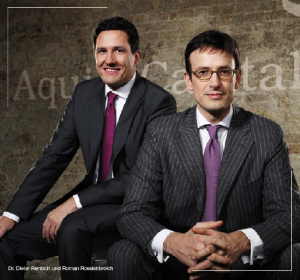
They say they know the names of the cows
Financial Times | 2 May 2010
By Steve Johnson
Even before the onset of the global financial crisis, German politicians saw fit to dismiss hedge funds and private equity groups as asset-stripping “locusts”.
Against such a backdrop it is perhaps unsurprising that Europe’s largest economy is not perceived to be at the cutting edge of alternative investment. But if there is one exception to this rule, the Hamburg-based Aquila Group may well be it.
Aquila Capital, its asset management arm, runs closed-end private equity-style funds investing in forestry, renewable energy and agricultural land, as well as a distressed shipping fund that owns its own ships, alongside equity stakes in shipowners.
On the hedge fund side, Aquila last year became the first house to launch a Ucits III-compliant commodity trading adviser (CTA) fund when it created an onshore version of its offshore Pharos fund.
Equally unusually, Aquila’s Statistical Value Market Neutral Fund is based on the FundCreator synthetic hedge fund model devised by Harry Kat, professor of risk management at London’s Cass Business School.
Now Aquila is creating waves by fleeing the Cayman Islands, the domicile of choice for the $1,600bn (£1,050bn, €1,210bn) hedge fund industry, and transferring its hedge funds to the European Union.
“We are moving all our offshore operations from Cayman to Malta,” says Roman Rosslenbroich, chief executive, who co-founded Aquila with Dieter Rentsch, a former nuclear technician turned chief investment officer, in 2001, creating what he bills as “the first independent boutique firm in Germany”.
Mr Rosslenbroich lauds the flexibility, robustness and cost effectiveness of the Maltese funds regime, while a Maltese jurisdiction could become particularly handy if the EU’s Alternative Investment Fund Managers directive, which proposes restrictions on the marketing of non-EU funds to investors in the 27-nation bloc, is approved in its current form.
Investors are also clamouring for greater protection, a factor behind Aquila’s embrace of Ucits hedge funds or Newcits.
The company recently closed the offshore versions of its Statistical Value product, migrating investors to a Ucits alternative, and Mr Rosslenbroich says “we didn’t really lose anybody important”.
“It takes some education but Ucits offers so many advantages. It’s much easier for us because we can concentrate on one product and there is also a marketing element to it. In Germany, having an offshore jurisdiction does not look good.”
Aquila Group
- Established: 2001
- Assets: Aquila Capital has €2.1bn under management; Alceda Fund Management has €3.3bn under administration and structuring
- Employees: 120
- Offices: Hamburg, Frankfurt, Cologne, Munich, Luxembourg, Zurich
Aquila’s Newcits arm accounts for €600m of its €2.1bn of assets under management, some 70-75 per cent of which emanates from German-speaking investors. But Mr Rosslenbroich is confident of strong demand for such products.
“A Cayman memorandum is very complex for an English person, let alone German or French. It’s really a pain in the neck. There are people who read a prospectus and didn’t understand what a gate was,” he says, referring to mechanisms that allowed hedge funds to limit redemptions during the market stresses of 2008.
“They understand now. They are not coming back. They will not invest in offshore hedge funds again.
“Pension funds, insurance companies and fiduciaries and also a lot of family offices are moving out of this space. If they still want an absolute return strategy they will look at Ucits.”
Still, Aquila’s foray into Cayman funds has yielded one spin-off benefit. Incorporating these vehicles onto the electronic fund systems familiar to German investors was so laborious that, in 2007, Aquila created a Luxembourg-based subsidiary to handle this task.
This division, Alceda Fund Management, now structures and administers funds and notes for third parties, such as investment bank trading desks, as well as Aquila. It has €3.3bn of assets under its remit.
Intriguingly, Mr Rosslenbroich says a recent series of Alceda roadshows in the US was “crowded” with investors particularly keen to understand more about European Ucits funds.
Aquila’s enthusiasm for highly liquid Newcits vehicles provides a counterpoint to its expertise in highly illiquid real assets, such as forestry and agricultural land, which Mr Rosslenbroich argues are essential for those who wish to invest long term but without getting tangled up in the foibles of the futures curve inherent in traditional commodity investment and the market beta embedded in any equity-based holding.
Most of these funds are structured as unlisted closed-end Konmmanditgesellschaft (KG) limited partnership vehicles with durations of as long as 12 years for the forestry offering and limited secondary markets. Luxembourg-domiciled versions or related structured notes are available for institutional investors.
“It doesn’t make sense to list these things because they almost always trade at a discount [to net asset value]. You have to accept they are illiquid but you are earning an illiquidity premium for this. The financial industry tries to make [these asset classes] liquid, but it doesn’t work.”
Mr Rosslenbroich is particularly enthusiastic about agriculture, where he says Aquila has “teams travelling the world looking for farms”, with New Zealand dairy farms a speciality.
The company’s hands-on approach is perhaps best exemplified by Detlef Schoen, manager of the Agri Opportunity fund, who has said of the properties the fund will buy: “We will not only know the name of the farmer, we will know the names of his cows.”
Mr Rosslenbroich adds: “It makes a huge amount ofsense from the point of view of the underlying economics,” given “the explosion of growth of people in the world”, and rising demand for products such as milk and meat as countries such as China and India become wealthier.
He also waxes lyrical about opportunities in renewable energy, particularly solar power, an industry in which Germany is a world leader and where there are long-term investment opportunities yielding 6.5 per cent, he says, more than twice the current 3 per cent yield on 10-year Bunds.













